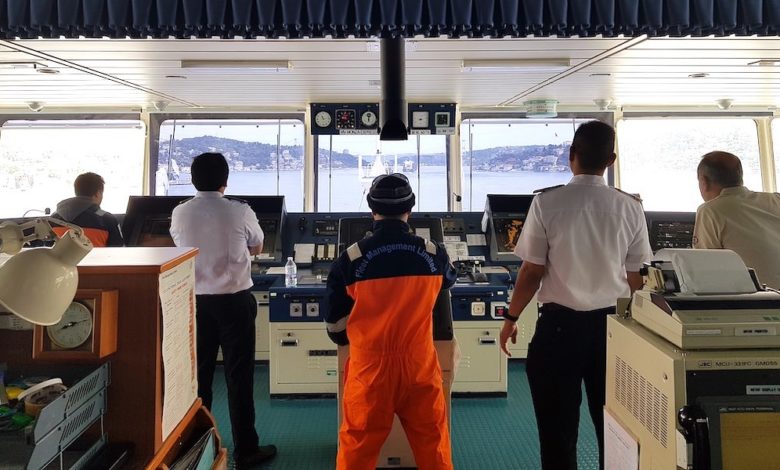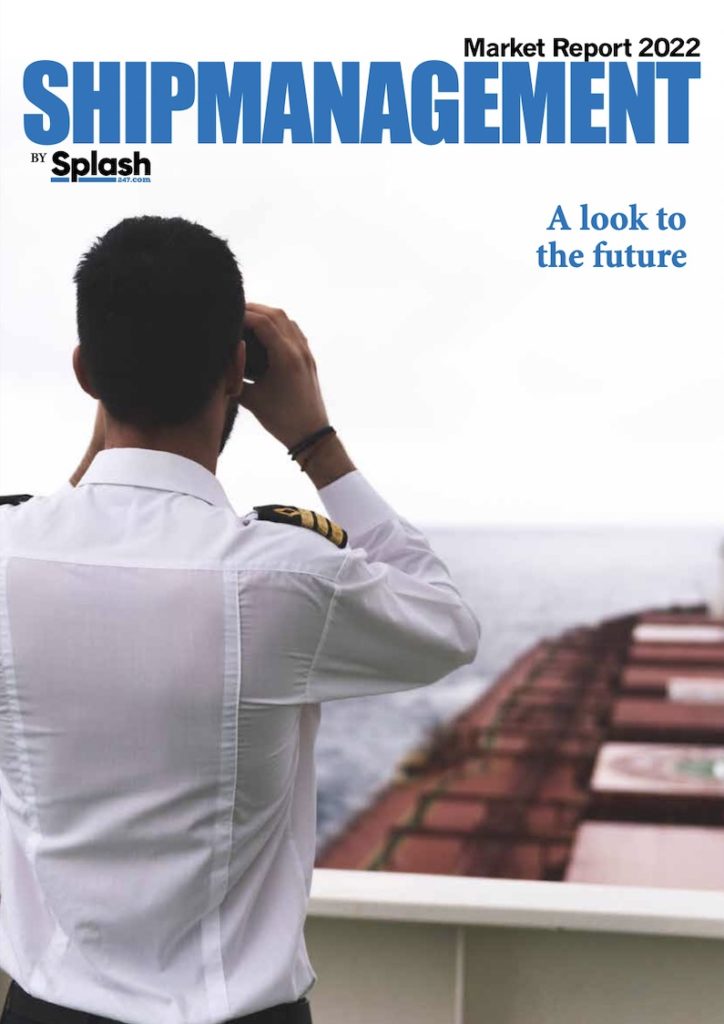The future of shipmanagement

How will shipmanagement transform in the coming years? Is there a risk other sectors will muscle into managers’ domain?
The business of shipmanagement is changing, perhaps more than it ever has done since the husbandry of vessels was first conceived back in the late 1960s. This is largely down to technological advances and greater transparency. Provocatively, Splash asked the world’s top shipmanagers whether or not they felt their current job remit was under threat. While asking them how they see their business transforming in the 2020s, we slipped in the controversial suggestion that today’s shipmanagers might be destined to become merely crewing companies when the big technology companies and engine companies create their own service operations and handle all the monitoring and technical aspects of the ships of the future. Our interviewees took this statement head-on.
Unmanned management
“We believe,” says Viridian’s Mohan, “as long as ships are manned, there will be the need for shipmanagers because technology as we know it today is not yet ready to handle the inconsistencies of humans in a largely variable environment.”
But for how long will ships be staffed at today’s levels? Sean McCormack, shipmanagement director at Northern Marine, sees his business diversifying as a result of shipboard technological breakthroughs coming in the 2020s.
There will be ships which can be easily adapted and safely operate in fully autonomous and semi-autonomous modes, he predicts. This will require, he says, a very different technical management ethos and mindset which will be split between clear operational and maintenance phases in the vessel cycle.
He also forecasts a reluctance for investment in the medium term which will drive the traditional model.
There will however be some shipping sectors where the risk/reward factors do not fully balance sufficiently to fully embrace the technology being adopted in fully autonomous and semi-autonomous, McCormack maintains.
Mistakes and inefficiencies tend to arise from silos of responsibility
“We see this following a more traditional route but with a major focus on data, efficiency, and optimisation to ensure risk is managed to as low as is reasonably practical but also embracing the technological advances seen in other sectors,” McCormack says.
Looking at the sector from the outside, Despina Panayiotou Theodosiou, joint CEO of Tototheo Maritime, a service provider specialising in digitalisation and satellite communications, tells Splash: “Shipmanagement is stuck between a rock and a hard place.” However, she believes it is too simplistic to say that shipmanagers will become crewing companies when some have long had that capacity, and others use dedicated crewing companies.
Also, she points out that while engine makers and technology companies may be promoting performance and maintenance-related services, they are not dealing with the whole vessel as a single entity.
Shipmanagers will be at the forefront of technological development, innovation, and R&D as they are best placed to suggest ways of working smarter using digital technology, maintains Claes Eek Thorstensen, vice chairman of Thome Group. Yes, there will be closer collaboration and interaction between shipmanagers, service providers and manufacturers to improve supply chain interactions by reducing paperwork and manual processes and replacing them with cloud-based solutions, but this will not impinge on the overall role of the shipmanager, Thorstensen reckons.
“The ABC of tech – artificial intelligence, big data, the cloud and cyber security – are the new norms and will be increasingly beneficial as we navigate the 2020s,” Thorstensen says.
John-Kaare Aune, CEO of Wallem Group, sees the development of advanced maritime solutions as an opportunity rather than a threat.
“The technology will improve operations not only for shipowners but also for us, by enhancing how we manage vessels and provide technical support,” Aune says.
In addition, given the resultant proliferation of data, owners will require the support of ship operations and maintenance experts who can analyse the information and make the best possible recommendations, he believes.
Strategic partners
The role of a shipmanager has evolved to become a strategic partner of his or her customers, suggests Kishore Rajvanshy, the managing director of Fleet Management, a man who has been working in the shipmanagement sector since 1979.
“The shipping industry is going through a transformative time, and shipmanagers are at the forefront of many of the biggest challenges, key issues, and developments driving change in our industry,” Rajvanshy says, going on to discuss areas such as seafarer health and wellbeing, decarbonisation, and using digital technology to improve a vessel’s safety, efficiency, and performance.
“We have more customers seeking our guidance and advice on key operational decisions and solutions that have a significant impact on protecting their investments and aligning with their business strategy. We’re also being invited to collaborate on major industry projects and studies on greener shipping because of the depth and breadth of our technical knowledge, expertise, and experience that no one else can bring to the table,” Rajvanshy points out.
Monitoring services can be hired but the decision making will still be dependent on managers
Shipmanagers were never supposed to be micro-managers, however the competition of numbers is forcing them to showcase more technology-driven management rather than optimum use of technology to aid decision-making, argues Sachit Sahoonja, CEO of Su-Nav.
“Monitoring services can be hired but the decision making will still be dependent on managers and a good manager will invest in technological aids rather than technology dependency to hoard numbers and cut out human interface from decision making,” Sahoonja says. Monitoring is the first step, he maintains, while the correct interpretation of facts and proactive planning is good management.
Technological development and automation has brought about the transparency that the industry has needed for a long time, concedes Vinay Gupta, the managing director of Singapore-based Union Marine Management Services (UMMS).
The quality of data that companies see coming ashore helps a management company to make the right decision at the right time, irrespective of the fact whether the management company is an in-house or third-party manager. The difference now lies, Gupta argues, in synthesising the data, making the correct analysis and making an educated decision that helps an owner and adds value to his or her business.
Remaining relevant
Mark O’Neil, president of Columbia Shipmanagement, admits shipmanagers face a challenge to remain relevant and compelling to customers.
Whilst shipmanagers may well work more closely with the technology companies and engine manufacturers in the future, O’Neil cannot foresee the allocation of ultimate responsibility and risk shifting away from the managers.
“Vessel management is very much a comprehensive, inter-related, holistic approach where each service is closely related to – and depends upon – the other,” O’Neil says. “Mistakes and inefficiencies tend to arise from silos of responsibility between the services, be they inside or outside the management company’s structure.”
As ships become increasingly connected like any office ashore, there is an opportunity, according to Anglo-Eastern’s head Bjorn Hojgaard, to unlock potential value by further integration of the ships into the value chain of the owner/charterer/manager interface.
“The differentiator for this,” Hojgaard says, “is in getting the people onboard and ashore working as one team, harnessing the same single truth data in real-time to jointly deliver a better service to end users, all whilst optimising fuel and speed performance in a world where energy will be increasingly expensive as we transition towards a fossil-free future.”
This cannot be achieved by simply remote monitoring individual pieces of machinery, Hojgaard says.
“It is in combining the various elements in serving a cargo need through the integration of all facets that make a ship an efficient vehicle for transportation, and I am confident of the role of shipmanagers in shipping’s future,” Hojgaard says.
Rajesh Unni, the founder of Synergy Marine Group, reckons that the managers who are best able to embrace and harvest technology will partner with technology suppliers and engine companies rather than be supplanted by them.
Unni can also see further consolidation in the sector this decade as he can see some of his rivals failing to manage the shift from competing solely on cost to competing on technology and skillsets.
“This requires high levels of investment and commitment and also a new mindset. Not everybody in our industry will make that jump in imagination,” Unni says.
“This is the era of the Industrial Revolution 4.0, characterised by a fusion of technologies that blurs the lines between the physical, digital, and biological spheres, shipmanagers who are future-fit will act as catalysts to take the business forward,” argues Mingfa Liu, the managing director of ship services at IMC Shipping.
Growth potential
Bjoern Sprotte, the head of shipmananagement at V.Group, notes estimates that suggest only 16% of the shipping industry is outsourced compared with rates of between 80% and 90% in other industries such as real estate.
“This,” he says, “presents a real opportunity.” Sprotte sees plenty of opportunities to work with a wide range of vessel owners in the future, including many who are choosing to outsource for the first time.
Different working environment
A big change brought about by the pandemic could become permanent this decade. “A global and hybrid working environment is here to stay as the benefits of working remotely have been realised and ways of working around Covid-19 travel restrictions have brought about some benefits,” says Thome’s Thorstensen, citing as examples the reduction in expensive travel costs and subsistence expenses by conducting audits and inspections remotely. This may continue in certain instances if approved by appropriate flag states and classification societies, he reckons.
Office teams have also worked effectively at home with minimal disruption to Thome services, Thorstensen relays.
This is one of the articles from Splash’s Shipmanagement Market Report, a 72-page magazine published this month. Splash readers can access the full magazine for free by clicking here.


Specialists in hiding problems, the unifying element in the behavior of all these ship managers is the complete absence of self-criticism, guilt or remorse. Unable to empathize, but not lacking certain magnetism of psychopaths.
Indeed.
Thanks for explaining how being mindful of fossil fuel usage is also important to consider when it comes to transportation shipment management solutions. I’m planning to look for such services soon because my husband and I are interested in starting a building material supplying business someday. Lots of shipments will have to be handled for a business like that.